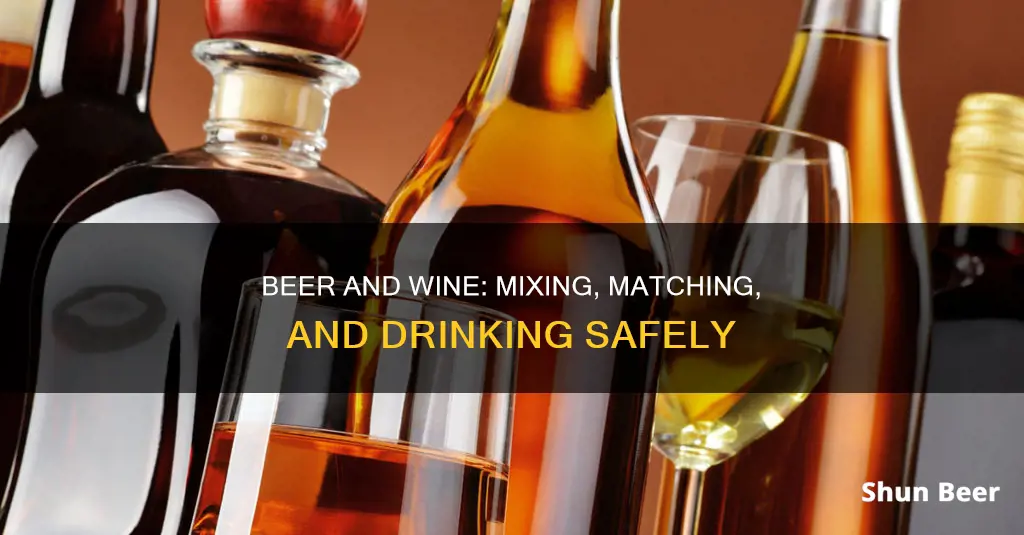
There is an age-old saying that goes: beer before wine and you'll feel fine; wine before beer and you'll feel queer. But is there any truth to this? Well, researchers at the Witten/Herdecke University in Germany and the University of Cambridge in the UK decided to find out. In a study, 90 participants aged 19-40 were split into three groups. The first group drank 2.5 pints of lager followed by four large glasses of white wine. The second group had the same drinks but in reverse order. The third group drank only wine or beer. The participants were asked to rate their drunkenness and, the next morning, their hangover. A week later, the groups switched, so the beer-then-wine group drank wine and then beer, and vice versa. The results showed that the order of drinks did not affect the severity of the hangover. So, while drinking wine after beer might not make you feel any worse, drinking too much of any alcoholic drink is likely to result in a hangover.
| Characteristics | Values |
|---|---|
| Does drinking wine after beer affect the intensity of a hangover? | No, the order of drinks does not affect hangover intensity. |
| Does drinking wine after beer affect how drunk you feel? | No, the order of drinks does not affect how drunk you feel. |
| Does drinking wine after beer make you sick? | No, but drinking too much alcohol can make you sick. |
What You'll Learn

Beer before wine, you'll be fine
There is a popular saying that goes, "Beer before wine and you'll feel fine; wine before beer and you'll feel queer". This implies that drinking beer before wine will not give you a hangover, but drinking wine before beer will. However, this saying has been debunked by researchers at Witten/Herdecke University in Germany and the University of Cambridge in the UK.
In their study, 90 participants aged 19 to 40 were split into three groups. The first group consumed 2.5 pints of cold lager beer followed by four large glasses of chilled white wine. The second group consumed the same amount of alcohol but in reverse. The third group, the control group, drank only wine or beer. The participants were asked to rate their level of drunkenness and rank their hangover symptoms. The study found no significant differences in hangover scores among the three groups.
The researchers concluded that the order of drinks did not matter and that drinking too much of any alcoholic drink is likely to result in a hangover. They also found that women tended to have slightly worse hangovers than men, and that vomiting and perceived drunkenness were associated with heavier hangovers.
So, while the saying "beer before wine, you'll be fine" may be catchy and memorable, it is not scientifically accurate. The total amount of alcohol consumed and individual factors such as age, sex, and body weight are more important in determining the severity of a hangover.
Apple Cider Vinegar and Beer: A Healthy Mix?
You may want to see also

Wine before beer, you'll feel queer
"Wine before beer, you'll feel queer" is a well-known saying that warns against drinking wine before beer. But is there any truth to this adage, or is it just an old wives' tale? Let's delve into the science behind this saying and explore whether it holds any weight.
The belief that drinking wine before beer will lead to unpleasant consequences is not a new concept. This idea has been passed down through generations, with many people swearing by its accuracy. However, it's essential to examine the evidence and understand the potential risks associated with mixing these two types of alcohol.
In an attempt to provide a definitive answer, researchers at Witten/Herdecke University in Germany and the University of Cambridge in the UK decided to put this saying to the test. Their study, published in the American Journal of Clinical Nutrition, aimed to determine if the order of drinking beer and wine had any impact on the severity of hangovers.
The experiment involved 90 participants aged 19 to 40, who were divided into three groups. The first group started with about two and a half pints of lager, followed by four large glasses of white wine. The second group did the opposite, starting with wine and then switching to beer. The third group, the control group, stuck to either beer or wine only. The participants were monitored throughout, answering questions about their well-being and rating their drunkenness on a scale. The following day, they were assessed for hangover symptoms using the Acute Hangover Scale.
The results of the study were quite revealing. It was found that the order of drinks had no significant impact on the severity of hangovers. Whether the participants started with beer or wine, their hangover scores were relatively consistent. This finding contradicts the "wine before beer, you'll feel queer" saying, suggesting that it may not be as reliable as some believe.
However, it's important to note that individual factors, such as age, sex, body weight, and drinking habits, did not seem to influence hangover intensity. Instead, vomiting and perceived drunkenness were better predictors of a heavier hangover. As Dr. Tarek Hassanein, a specialist at the Southern California Liver Centers, explains, "The order in which you drink alcohol does not matter because it all reflects on how many grams of alcohol the person is drinking."
So, while the saying "wine before beer, you'll feel queer" has been passed down through the years, scientific evidence suggests that it may not hold much weight. It's not the order of drinks that matters, but rather the total amount of alcohol consumed and individual factors such as hydration and metabolism. As with all alcohol consumption, it's important to drink responsibly and pay attention to your body's responses to avoid unpleasant consequences.
Beer Consumption: What's Safe to Drink?
You may want to see also

The order of drinks doesn't matter
There is a popular saying that goes, "beer before wine and you'll feel fine; wine before beer and you'll feel queer". However, researchers at Witten/Herdecke University in Germany and the University of Cambridge in the United Kingdom have debunked this myth.
In a study, 90 participants aged 19 to 40 were split into three groups. The first group consumed 2.5 pints of cold lager beer followed by four large glasses of chilled white wine. The second group consumed the same amount of alcohol but in reverse. The third group, the "control group", drank only wine or beer. The participants were asked to rate their level of drunkenness and rank their hangover symptoms. A week later, the groups that drank both beer and wine repeated the experiment in reverse.
The researchers found no significant differences in hangover scores among the three groups. No matter the drinking order, participants reported similar hangover intensities. The study concluded that the order of drinks does not matter and that drinking too much of any alcoholic drink is likely to result in a hangover.
While the study debunked the saying for white wine and lager beer, it is important to note that it did not include red wine, spirits, or dark beers. Additionally, previous studies have found that some dark spirits and drinks with more congeners (natural compounds that give off distinctive flavours and colours) may make hangovers worse.
In conclusion, while the specific order of drinks may not matter in terms of hangover intensity, it is still important to drink responsibly and in moderation.
Buttermilk Beer Batter: Does Druesteaz Mix Work?
You may want to see also

Drinking lighter alcohol after stronger alcohol is discouraged
While drinking lighter alcohol after stronger alcohol is a popular drinking culture belief, it is not supported by scientific evidence. The total amount of alcohol consumed and the rate of consumption are the main factors influencing the severity of a hangover.
A study by researchers at the Witten/Herdecke University in Germany and the University of Cambridge in the United Kingdom found no significant difference in hangover intensity between participants who consumed beer followed by wine, and those who consumed wine followed by beer. The study, which included 90 participants aged 19 to 40, measured hangover symptoms using the Acute Hangover Scale, which accounts for factors such as thirst, fatigue, headache, dizziness, nausea, stomach ache, increased heart rate, and loss of appetite. The results showed that the order of drinking beer and wine did not affect the severity of hangover symptoms.
Another factor that influences the severity of hangover symptoms is the presence of congeners, which are natural compounds in liquor that give distinct flavours and colours. Drinks with higher congeners, such as dark spirits and red wine, tend to cause more severe hangovers compared to lighter-coloured beverages like vodka. Therefore, it is not just the alcohol content but also the presence of congeners that can contribute to a worse hangover.
While drinking lighter alcohol after stronger alcohol may not directly influence hangover intensity, it is important to note that mixing different types of alcohol can affect your overall consumption and drinking behaviour. Starting with stronger alcohol may lead to faster intoxication, making it challenging to keep track of your drink intake. Additionally, carbonation in drinks like beer can cause the alcohol to "hit your head" faster, which might influence your drinking pace and overall consumption.
In conclusion, while there is no scientific evidence to support the belief that drinking lighter alcohol after stronger alcohol is inherently harmful, it is crucial to prioritise responsible drinking. The total amount of alcohol consumed, the rate of consumption, and the presence of congeners are the key factors influencing hangover severity. To minimise the risk of severe hangovers, it is advisable to practise moderation and pay attention to your body's responses to different types and amounts of alcohol.
Beer and Weight Loss: Is It Possible to Have Both?
You may want to see also

Hangover symptoms
The old saying goes, "beer before wine and you'll feel fine; wine before beer and you'll feel queer". However, this has been debunked by scientists. In a study, 90 volunteers were split into three groups. The first drank lager followed by white wine, the second had the same drinks but in reverse order, and the third group had only beer or wine. The participants were then quizzed on their hangover symptoms, which included thirst, fatigue, headache, dizziness, nausea, stomach ache, a fast heart rate, and loss of appetite. The results showed that the order of drinks had no impact on the intensity of the hangover.
Hangovers can vary from person to person, but typical symptoms include fatigue, weakness, thirst, headache, muscle aches, nausea, stomach pain, vertigo, sensitivity to light and sound, anxiety, irritability, sweating, and increased blood pressure. Hangovers are caused by drinking too much alcohol, but other components of alcoholic beverages may also contribute to or worsen hangover symptoms. These include congeners, which are compounds produced during fermentation that give drinks their taste and smell, and sulfites, which are added to wine as preservatives. People with a sensitivity to sulfites may experience a headache after drinking wine.
Mild dehydration is also a factor in hangovers, as alcohol suppresses the release of vasopressin, a hormone that signals the kidneys to retain fluid, leading to increased urination and fluid loss. Disrupted sleep, gastrointestinal irritation, inflammation, and acetaldehyde exposure from alcohol metabolism can also contribute to hangover symptoms.
Beer's Power: Removing Trapped Gas, Always
You may want to see also
Frequently asked questions
According to a study by the University of Cambridge, the order of drinks does not matter. Whether you drink beer and then wine, or wine and then beer, you will still experience a hangover.
Hangovers are caused by alcohol, and the total amount of alcohol consumed will have a bigger effect on how you feel than the specific order of drinks.
Alcohol causes hangovers in two main ways. Firstly, it diverts water from your bloodstream to your bladder, resulting in dehydration and a headache. Secondly, the liver produces acetaldehyde, an intermediate product of alcohol digestion, which is even more toxic than alcohol.







